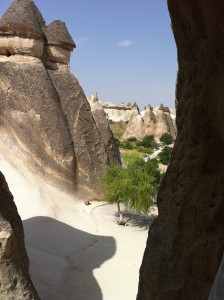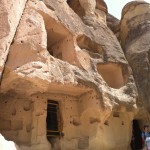
This day began early. We were out of our hotel by 6:00 a.m. on our way to the airport to catch a flight to Kayseri (in English “Caesar”), our ultimate destination a Central Turkey region called Cappadocia.
Cappadocia was once inhabited by the Hittites (as in “Uriah the Hittite,” 2 Samuel 11), then the Greeks, and for the last several hundred years, the Turks. Cappadocia is known for its otherworldly rock formations, which were created by the two hands of desert heat and mountain snow placed on volcanic rock and spun by a persistent wind. The result appears as purposeful as anything that has ever left the potter’s wheel, as you can see from the photograph.
In the late morning, we visited Goreme, another cave-community, this one used as a seminary where St. Basil taught Christianity to the locals and to aspiring priests. The churches carved out of the rock at Goreme contain frescos more than 1,000 years old that have survived Iconoclast and Muslim defacement.
After a long relaxing lunch finished off with a Turkish coffee, we stopped in a small village for some shopping. The Turks have been very friendly to us everywhere we’ve been, and in this village a local proprietor offer us tea and was so friendly we were looking for things to buy from him. Did I mention the Turks are also very good businessmen?
We ended our tour of Cappadocia at an underground cave-city. Like the cave city at Zelve, the Hittites used this underground city to escape from their enemies. The Greeks used the underground city after the Hittites, followed by the Christians, who used the underground city to escape persecution from the pagans.

Christians in caves was the theme of the day. What’s interesting is that even after the persecution ended and Christianity became the religion of the Roman Empire, the Christians at Zelve and in other cave communities in Cappadocia, continued to live and worship in the caves. Moreover, other Christians joined them, apparently desiring the community of other believers to the challenge of discipling the nations.
In it’s nascent stages in a hostile intolerant culture, it’s sometimes necessary for the Church to remain underground. This is certainly the case now in China and Iran. But the destiny of the kingdom of God is not the seed planted in the ground but the tree in whose branches the birds of the air nest.
Leaven only changes the dough when it is in contact with it; salt requires a similar interaction. What was true in Cappadocia in the days of the early church is true today. Christians will not change the world escaping from it, but from engaging it. One doesn’t change the world from a cave.
Until tomorrow… GS
